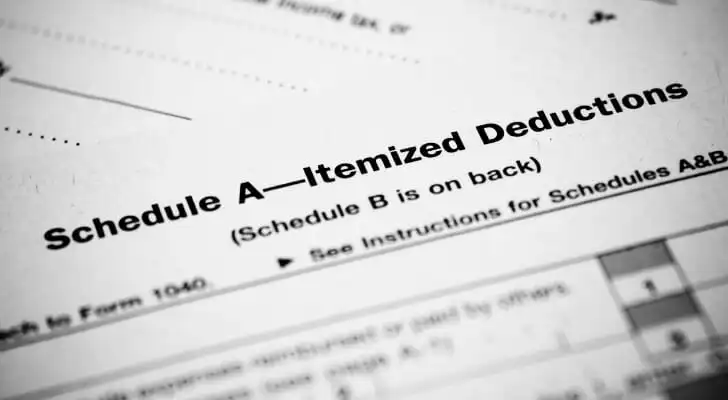Are financial planning fees tax-deductible? While financial planning fees related to investment advice were deductible in the past, the 2017 Tax Cuts and Jobs Act (TCJA) eliminated the deduction through 2025. And the One Big Beautiful Act has extended that provision to keep these fees non-deductible. A financial advisor can help you structure your finances to align with the current tax laws.
Are Financial Advisor Fees Tax-Deductible?
Before the Tax Cuts and Jobs Act took effect, investors were allowed to reduce their taxable income by claiming a deduction for miscellaneous itemized deductions. That included deductions for investment-related expenses, such as:
- Financial advisor fees
- Custodial fees paid to IRA accounts
- Accounting costs
- Fees for legal and tax advice
- Trustee fees
To qualify for this tax break, taxpayers had to show miscellaneous itemized deductions greater than 2% of their adjusted gross income (AGI) for the year. So, for example, if your AGI was $200,000 in 2017, you could have deducted financial advisor fees and other investment-related expenses in excess of $4,000 or 2% of AGI. If you paid $6,000 in fees to your advisor, $2,000 of that would have been eligible for the deduction.
The Tax Cuts and Jobs Act, however, eliminated these deductions beginning with the 2018 tax year. This change to the tax code, along with others established by the act, were expected to expire after 2025. However, the One Big Beautiful Act extended this 2017 TCJA provision, which makes financial planning fees non-deductible beyond 2025.
What Can You Deduct as an Investor?

While you can no longer deduct financial advisor fees, there are some other tax breaks you may be able to take advantage of as an investor.
First, if you’re investing in a 401(k) or similar plan at your workplace, you get the benefit of having those contributions automatically deducted from your taxable income. This is a type of above-the-line deduction, meaning you can deduct those amounts regardless of whether you itemize or not. Contributions to a health savings account (HSA) would also be considered an above-the-line deduction.
Next, you may be able to deduct contributions made to a traditional IRA. Whether you can deduct those contributions and the amount you can deduct depends on your income, filing status and whether you’re covered by a retirement plan at work. For tax year 2026, if you’re covered by a retirement plan through your job, you can deduct your full contribution to a traditional IRA if:
- You file single or head of household and your modified AGI is $81,000 or less
- You’re married, filing jointly with a modified AGI of $129,000 or less
Married couples who file separately would not be eligible for a full deduction, though they may be able to claim a partial deduction for traditional IRA contributions. If you’re not covered by a retirement plan at work, file single or head of household or are married and your spouse is also not covered by a retirement plan at work then you can deduct your full traditional IRA contribution regardless of income. Keep in mind that the Internal Revenue Service (IRS) adjusts the AGI limits for traditional IRA deductions regularly to account for inflation.
Here’s a look at the IRA deduction ranges for 2026:
| Filing Status | AGI Range for Full Deduction | AGI Range for Partial Deduction | AGI Range for No Deduction |
|---|---|---|---|
| Single or Head of Household (active participant) | Less than $81,000 | $81,000 – $91,000 | More than $91,000 |
| Married Filing Jointly (active participant) | Less than $129,000 | $129,000 – $149,000 | More than $149,000 |
| Married Filing Jointly (spouse is active participant) | Less than $242,000 | $242,000 – $252,000 | More than $252,000 |
| Married Filing Separately (active participant) | N/A | $0 – $10,000 | More than $10,000 |
Investment interest expenses also remain tax-deductible under the Tax Cuts and Jobs Act. If you itemize on Schedule A, you can deduct interest paid on any money you borrowed to purchase taxable investments. That includes interest paid on margin loans if you’re trading on margin inside a taxable brokerage account. The total amount of this deduction is capped at the amount of net taxable investment income you have for the year.
Tax Strategies for Investing
Minimizing your tax liability as an investor can help you keep more of the returns you earn. While financial advisor fees are no longer deductible, there are things you can do to keep your tax bill as low as possible.
For example, those strategies include:
- Utilizing tax-advantaged accounts, such as a 401(k) or IRA to invest
- Maxing out the annual contribution limits to those accounts to reduce your taxable income for the year
- Investing in tax-efficient securities, such as exchange-traded funds, inside a taxable brokerage account
- Diversifying with other tax-efficient investments like real estate that yield depreciation benefits and other tax breaks
- Holding assets for more than one year to take advantage of the more favorable long-term capital gains tax rate
- Using tax-loss harvesting strategies to balance capital losses against capital gains
Tax-loss harvesting can be particularly effective for minimizing the amount of tax you have to pay on investments. This simply involves selling off assets that have underperformed at a loss to help offset any capital gains you may have to report for the year.
When harvesting losses inside your taxable account, it’s important to watch out for violations of the IRS wash sale rule, which could cost you tax benefits. The wash sale rule dictates that you can’t replace an asset with a substantially similar one for the purposes of tax-loss harvesting either 30 days before or 30 days after selling an asset at a loss.
If that sounds complicated to you, it may be worth talking to your financial advisor to see if tax loss harvesting is a strategy that can work for you. Your advisor can also review your portfolio’s asset allocation and asset location to help you fine tune your tax management strategy.
Bottom Line

While financial advisor fees are not tax-deductible now, that doesn’t mean they won’t be again at some point in the future. Paying attention to changes in the tax code can help you look for opportunities to minimize the amount of taxes you pay on your investments. If you have a dedicated tax professional you work with, they can also help with managing your tax liability.
Tips for Tax Management
- Consider talking to a financial advisor about the best ways to manage taxes each year. Finding a financial advisor doesn’t have to be hard. SmartAsset’s free tool matches you with vetted financial advisors who serve your area, and you can have a free introductory call with your advisor matches to decide which one you feel is right for you. If you’re ready to find an advisor who can help you achieve your financial goals, get started now.
- SmartAsset’s federal income tax calculator can quickly give you a good idea of what you’ll owe Uncle Sam. This will help enormously when it comes time to plan our your taxes for the year.
Next Steps
Do you want to learn more about financial advisors? Check out these articles:
- How to Choose a Financial Advisor?
- What Commissions Do Financial Advisors Earn?
- How Do Financial Advisors Make Money?
- How Much Does a Financial Advisor Cost?
- Is It Worth Paying a Financial Advisor 1%?
Photo credit: ©iStock.com/fizkes, ©iStock.com/emmgunn, ©iStock.com/Mackon
